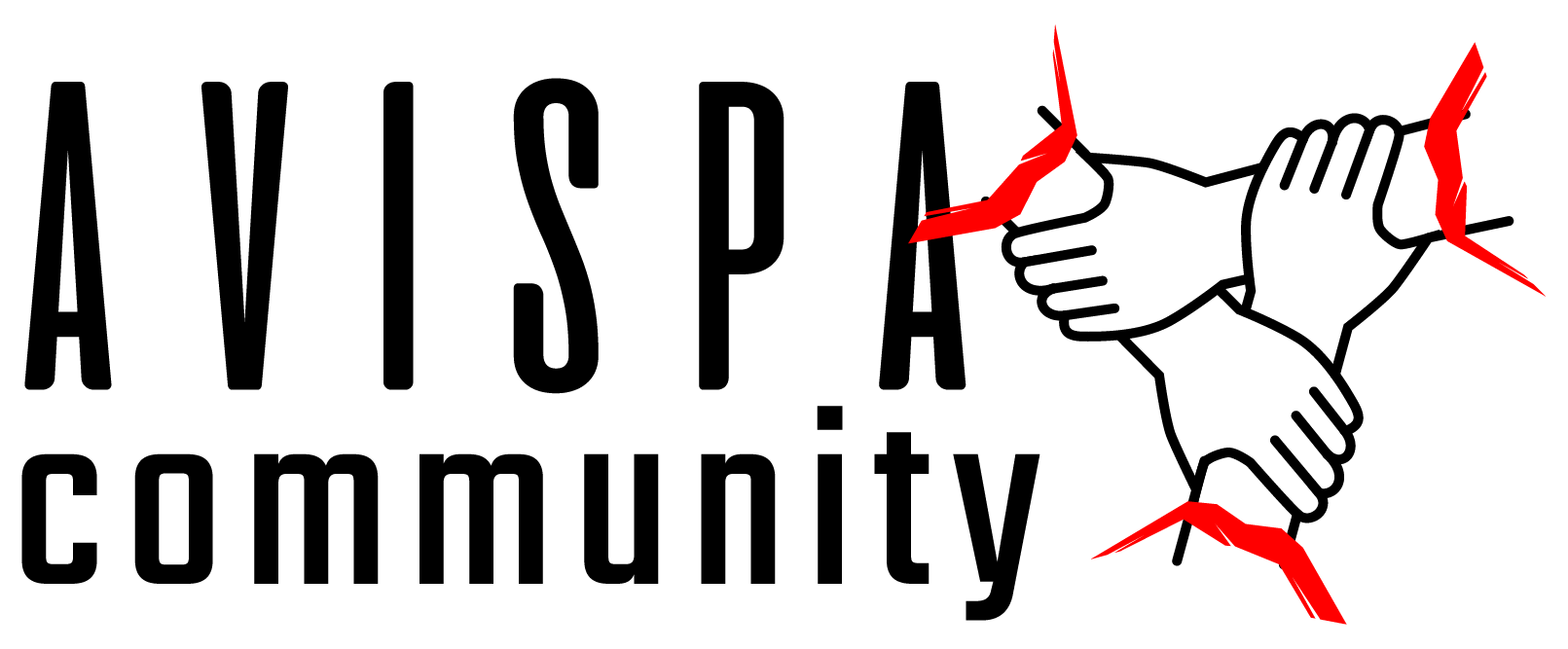Cover image: Abandoned oil well leaks in the north of Veracruz. The leak affects the land and water sources of the nearby communities. Photo: Regina López
There are many cases in Mexico exemplifying the increasing violence used against campesino and Indigenous populations in order to impose megaprojects. Here, we share an analysis from inhabitants of northern Veracruz, in the region of Totonacapan, about the links between the three actors they consider to be fundamental for the dispossession of territories: business, state, and crime.
Óscar Espino, activist and human rights defender in Veracruz, who accompanies collectives looking for the disappeared and is also a member of the National Indigenous Congress (CNI), argues that the logic of terror imposed by these actors seeks to demobilize the population thus avoiding community organization and resistance.
According to the reflection of the communities of Totonacapan, the violence of these three actors facilitates the hollowing out of meaning of the territories for multidimensional dispossession: territorial, economic, organizational, and political, among others, in order to produce these areas as merely extraction zones.
“You cannot fight a logic of terror imposed on your territory, thus the logic of geoterror,” sustains Espino, exemplifing it with the context of northern Veracruz, a region plunged into violence with executions and disappearances, marked as a priority zone, historic and contemporary, for the extraction of hydrocarbons.
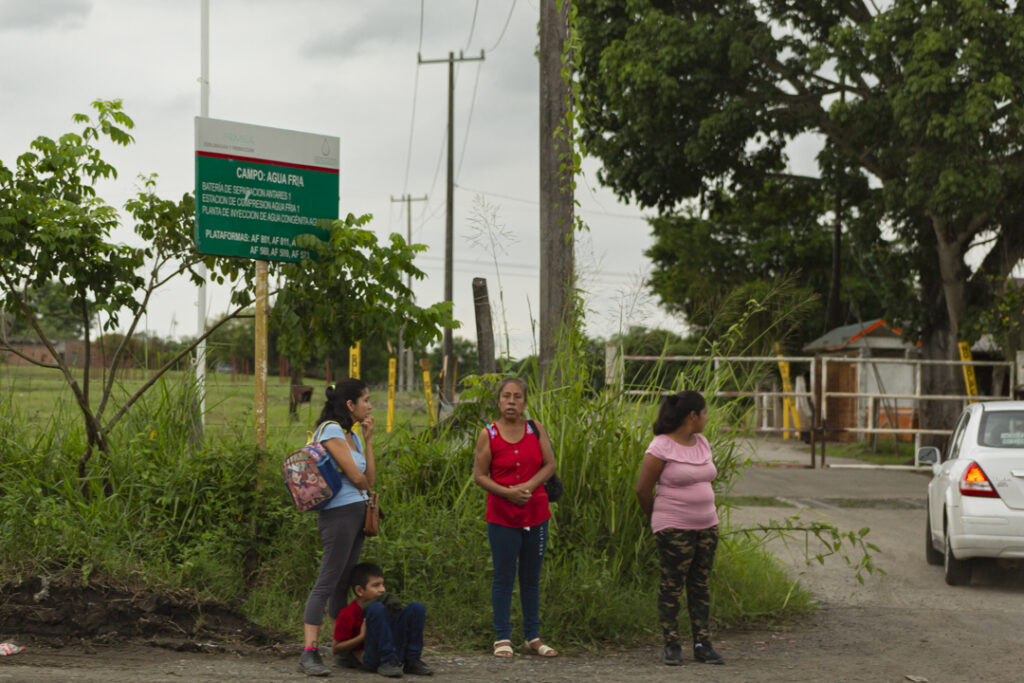
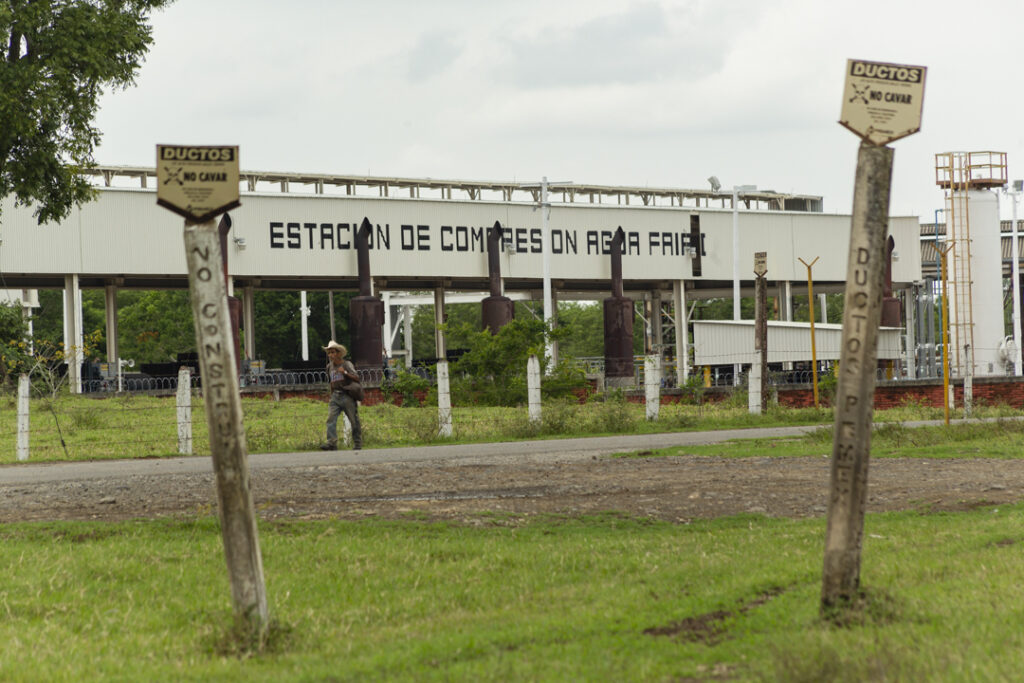
Photos: Regina López
For Óscar Espino, the intention of these strategies of geoterror is to get the communities out of their way, the communities that “interfere” with plans to impose “development” megaprojects.
Northern Veracruz is traversed by multiple megaprojects looking to exploit water resources, like the Proyecto Trasvase de Pánuco, that seeks to extract water to send it to the northern states of Tamaulipas and Nuevo León.
Also, it seeks to continue with the extraction of hydrocarbons through nonconventional methods, like hydraulic fracking, with the project Aceite Terciario del Golfo (ATG). According to the National Hydrocarbons Commission (CNH), in this region, 3,358 wells have been fracked.
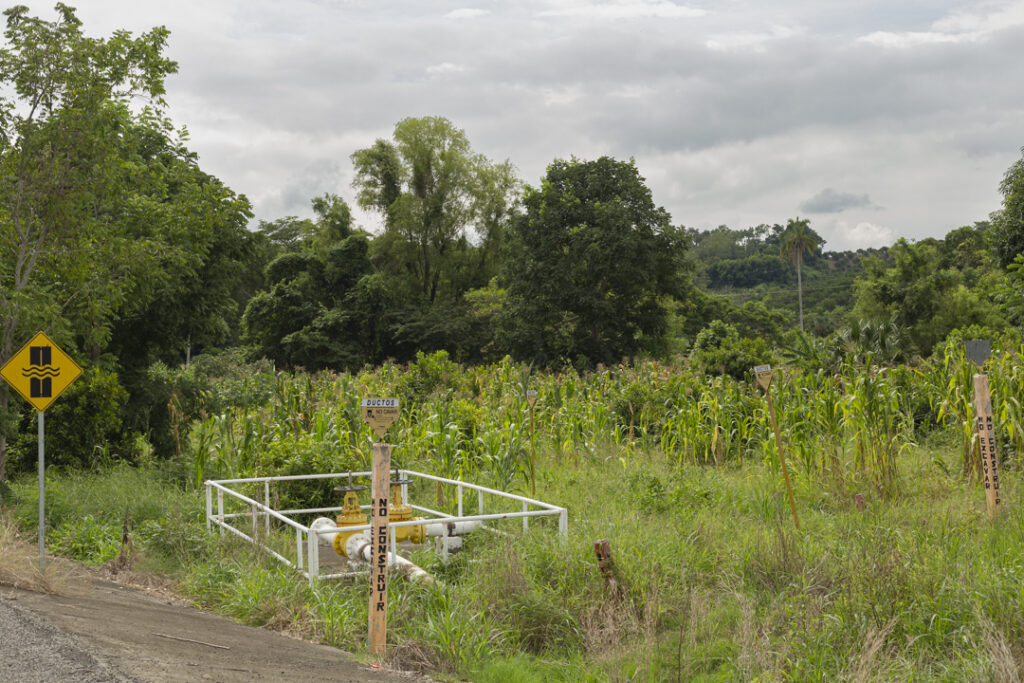
Photo: Regina López
Added to this are the effects on the ecosystems of the Gulf of Mexico due to the passage of the Puerta al Sureste gas pipeline, a 715-kilometer underwater pipeline that will connect with infrastructure in the south of Texas, for the exportation of natural gas from the United States and Canada.
According to testimony of Espino, the actions of the companies, state, and organized crime have the objective of transforming campesino life, converting them into caretakers and promotors, submissive to the megaproject. According to the analysis, this is not achieved only through violence. “This logic of terror begins, not with weapons, but with seduction,” emphasizes the activist on the conditions that limit community articulation and organization for the defense of the territories in this part of the country.
This publication is part of a series of dialogues with participants in the assembly of the National Indigenous Congress carried out in Puebla in 2023. Below, we present extracts from the conversation with Óscar Espino.
Avispa Midia (AM): During the meetings with delegates of the National Indigenous Congress you shared some points of reflection that you all have carried out in northern Veracruz about what you call strategies of geoterror. Could you speak a little more about that?
Óscar Espino (OE): We have carried out this analysis collectively, between peoples, communities, and organizations in Totonacapan. First, we didn’t realize what mechanisms the state, companies, and organized crime were using in our territories, but we knew that these three actors were planting fear in the communities.
We saw these three things as isolated; organized crime doing its own thing, saying that they are dedicated to the narco question; companies planning their hydrocarbon megaprojects; the state making laws and carrying out harassment and repression, or pointing the finger at the communities.
But when we began to deepen our analysis, we realized that there is synergy, an alliance between these three actors and other powerful actors in the region, like local caciques who are entrenched in Indigenous and campesino communities functioning also as a mechanism of agglutination of these three actors planting terror and fear in the communities.
AM. What are the effects in the territories of Totonacapan derived from these strategies of geoterror?
OE: For the communities it has been very difficult to see how their territories began to be renamed. It stops being Totonacapan to convert, for example, into Zeta territory; a strategic field of extraction of hydrocarbons like the “Aceite Terciario del Golfo;” a buffer zone for strategic projects, of exploration and extraction of hydrocarbons. To name the territory in certain ways also gives it meaning. Renaming it is also a form of emptying out the territory. What we say is that there is synergy between these actors, both from the state, as well as organized crime and companies, to empty the territory of its heart and knowledge. It is not that we aren’t in the territory, but that we are losing our connection to it, and that connection is being lost because of this logic of terror.
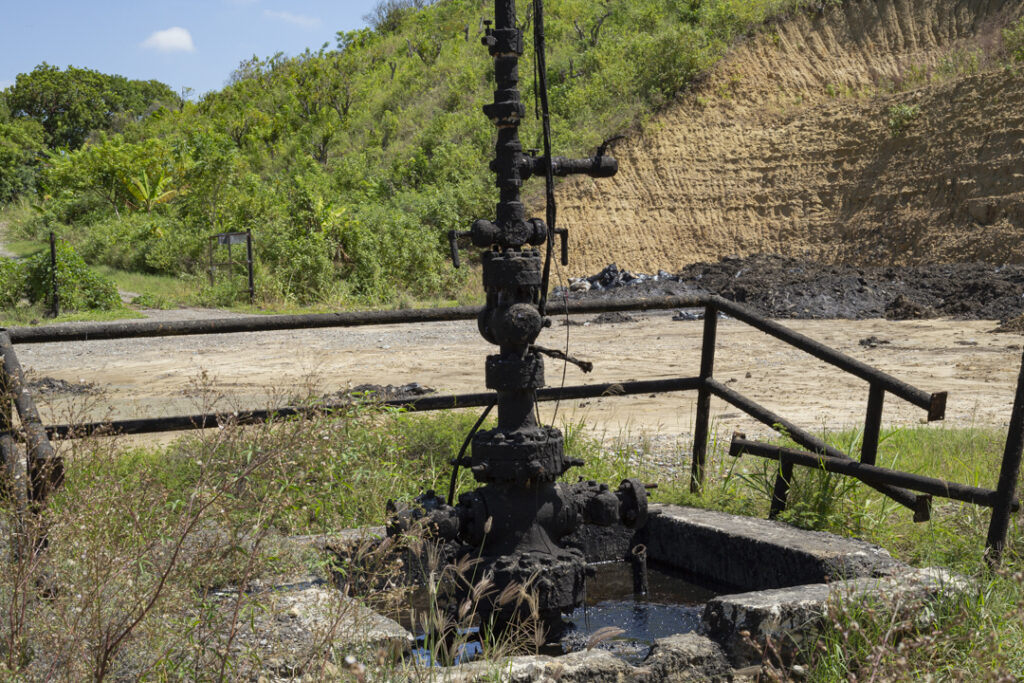
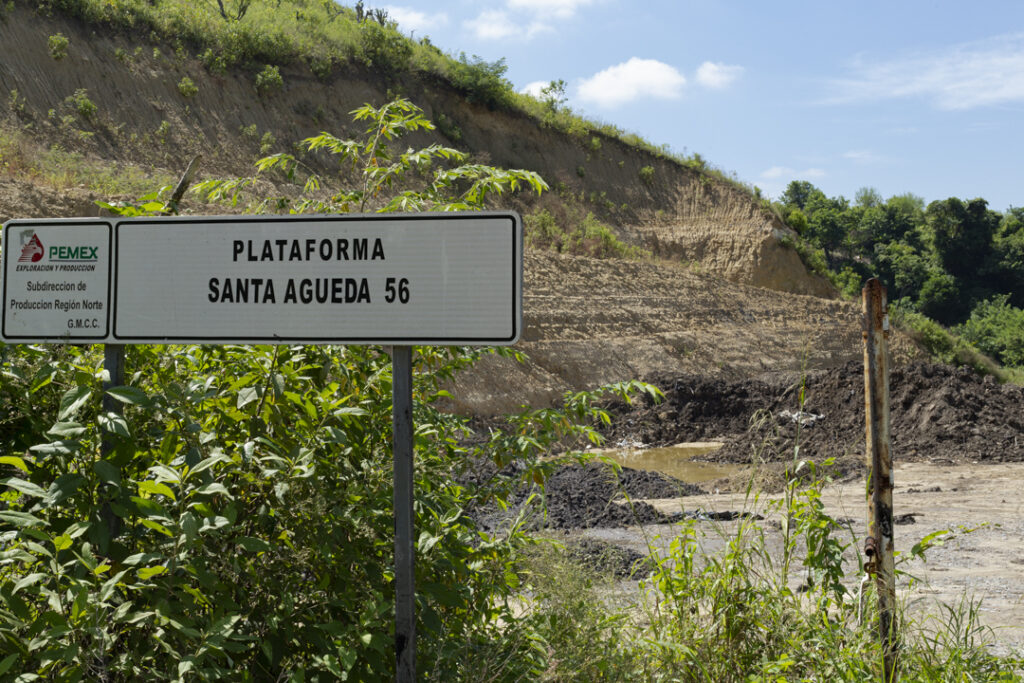
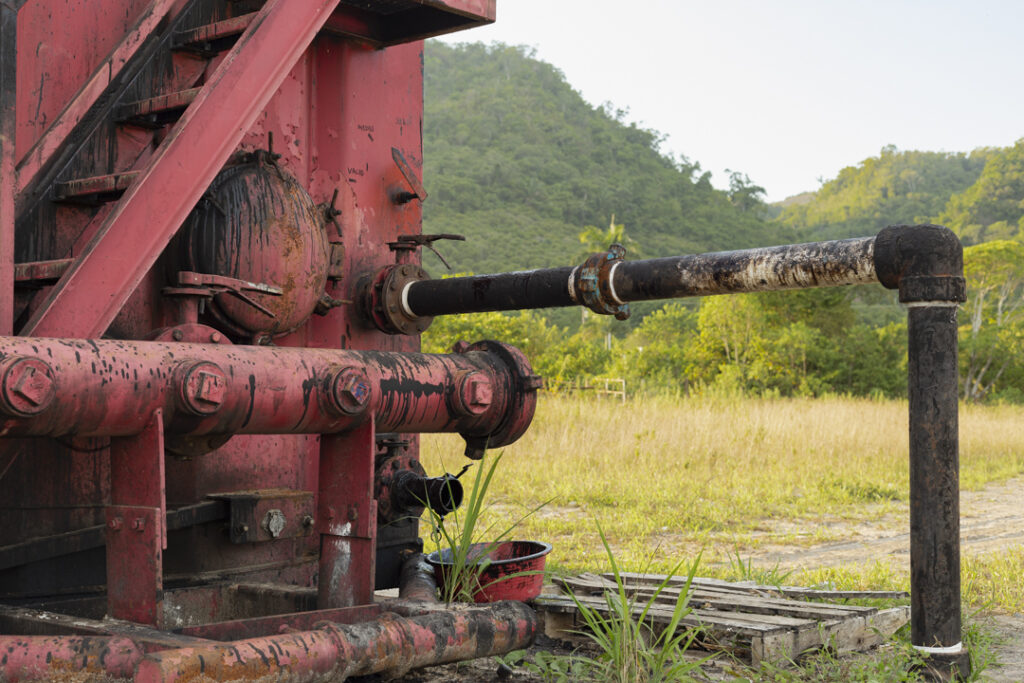
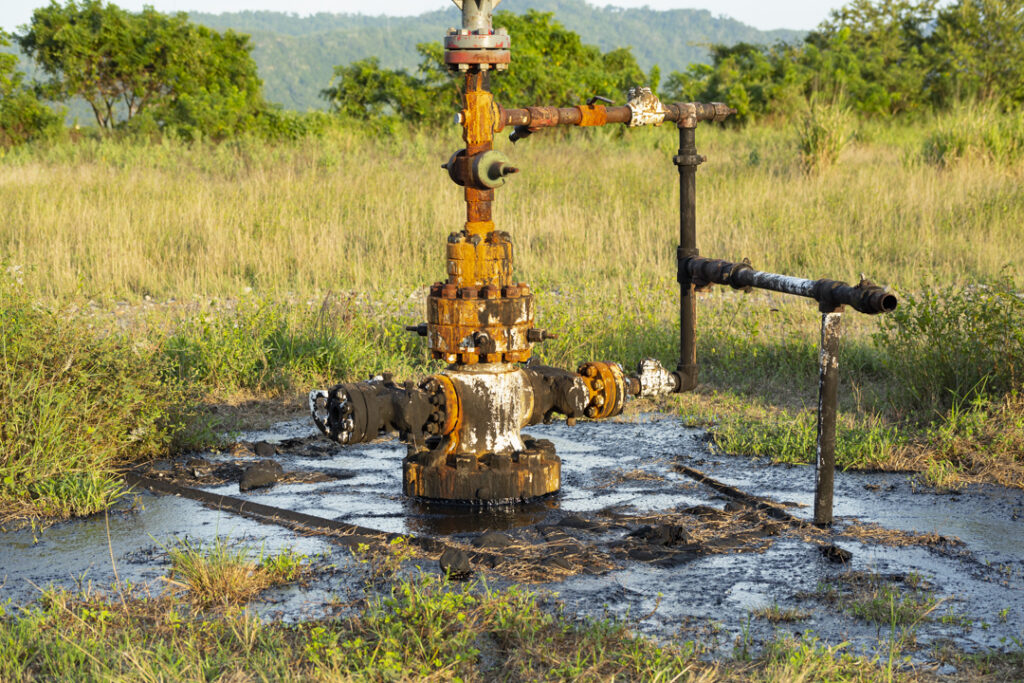
Infrastructure for the extraction of hydrocarbons in the municipality of Papantla, Veracruz. Photos: Regina López
We see other communities that rise up and struggle. Yet its not the same, a community to which the mining company is just now arriving, and which has all the information and can stand up to the mining company, and Totonacapan that has lived through 120 years of exploration and extraction of hydrocarbons. What this means is that there are generations, including grandparents, great-grandparents, who were born with oil wells in their communities, with dispossession from the beginning of their lives, of not feeling at home because the first ones who were there were displaced and have been relegated to live in spaces of coexistence or permanent conflict with the exploration and extraction of hydrocarbons.
I am talking about the first wells at the beginning of the last century. We are talking about more than 100 years of exploration and extraction of hydrocarbons, but also an economic logic associated with the life of hydrocarbons. Yet the people didn’t imagine the devastation. They went out to the street, fascinated by the machines that arrived, but they began to see the destruction when under their houses or where they sought to plant their food, they began to see a network of pipelines. So, the control and decisions people had over their territory began to be limited.
The question here is how their lives have been threatened by the pipelines of the companies of Petroleo Mexicanos (PEMEX), and how their lives are at permanent risk.
There are communities that have, for example, turbine power plants with a deafening noise. Throughout the entire community, to be able to talk, you have to shout. It is a system of deprivation and risk that begins with health itself.
There are people with really bad health problems due to the gas vented in the zone that is not regulated and that the state says is within the controlled parameters of gas emissions. That is totally false. Furthermore, this is associated with a network of pipelines of infrastructure for the extraction of hydrocarbons that requires the use of water. For example, communities that do not have water, PEMEX arrives saying that they can give them water. So the communities say, “great,” but this has produced precarious conditions because they continue without water as the water is used for the extraction of hydrocarbons.
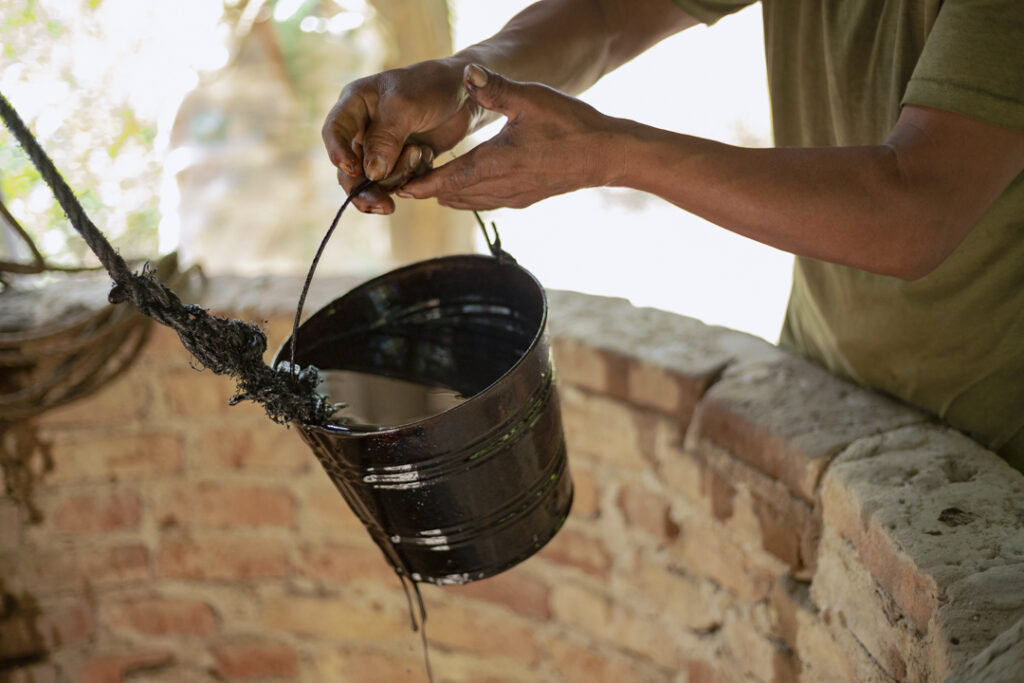
Water well contaminated by oil leaks in the north of Veracruz. Photo: Regina López
And an entire system of control is also associated with the territory. First, the depreciation of campesino life, and next, the rise in prices in their territories. So, they say, “Ok. How? My land isn’t useful for planting, ad then the private companies arrive.”
Because people from outside the community began to arrive, contracted by PEMEX and other companies to explore the mountains, valleys, and territories of the communities to locate zones for exploration.
We learned from a human rights center, that they drugged people so that they could endure the dehumanizing work days, in heat of more than 40 degrees Celsius in Totonacapan, and they would go locate the wells. After that, the work they gave to the local people isn’t work of engineers or oilmen, it is cleaning the sludge, the most unhealthy and depredatory work for the people.
AM: You were talking about the violent methods of dispossession of territories, but also of other strategies that do not imply the use of force. Could you give us some examples?
OE: The communities are a threat to the logic of the megaproject. This logic isn’t only hindering the relation of the campesino with his territory, but the campesino being campesino. They need the campesinos to be other things, to be caretakers of the megaproject, to submit to the megaproject. This logic of terror begins like that, it does not begin with arms, it begins with seduction. A hegemony is imposed, they call it a “soft” hegemony, imposed on the people in a way that convinces them, from the precarity of campesino and Indigenous life, abandoned by the state system. Then the companies arrive and they say, “what is the most important necessity you all have at this moment?”
And they invented a program called Program of Support for the Communities and Environment (PACMA). Imagine that, those who are doing the pillaging are talking about supporting the community and the environment. Well, with this program, they offered local infrastructure projects. So, a human rights defender arrives and says to the people of the communities “no, compañeros, they are tricking you,” but nothing comes of it. Meanwhile, those from the program arrived and said, “Here it is” the money for the infrastructure project.
This brought the logic of the companies to the communities. There is no longer direct conflict where the communities put themselves in front of the wells, because the people resisting began to be criminalized. Negotiations began, it wasn’t even negotiation, it was subjugation.
That logic began to introduce terror in the community, the fear of living in one’s own territory thinking that the following day they might be removed. That the following day, the wells are going to be exploited, that there is going to be a spill, an explosion, or that the following day, in your water well, in place of water, you get crude oil. Or that you will see dead animals because in the river where they were consuming water, there was a spill. It is a permanent fear of death.
AM: How does private capital fit into this scheme of imposing the logic of terror?
OE: The managers of private companies began to appear, contracted by PEMEX, for subcontracts for activities that Pemex couldn’t do. This transition was changing in such a way that, first, you saw only PEMEX, and afterwards we began to count up to more than 40 private companies. There were companies that manage the pipelines, that manage the liquids, that manage the chemicals, that manage the exploration, that provide the iron, that remove it; each company with its own logic and each one of them taking no responsibility. You no longer knew who to fight against.
There started to be private company security and, after that, we began to see how, at the same time, they began to introduce the megaproject; they began to introduce drugs and organized crime. What we didn’t know is that the objective was to displace complete families, displace complete communities, displace concrete actors in the communities, to install fear, to impose a logic of terror.
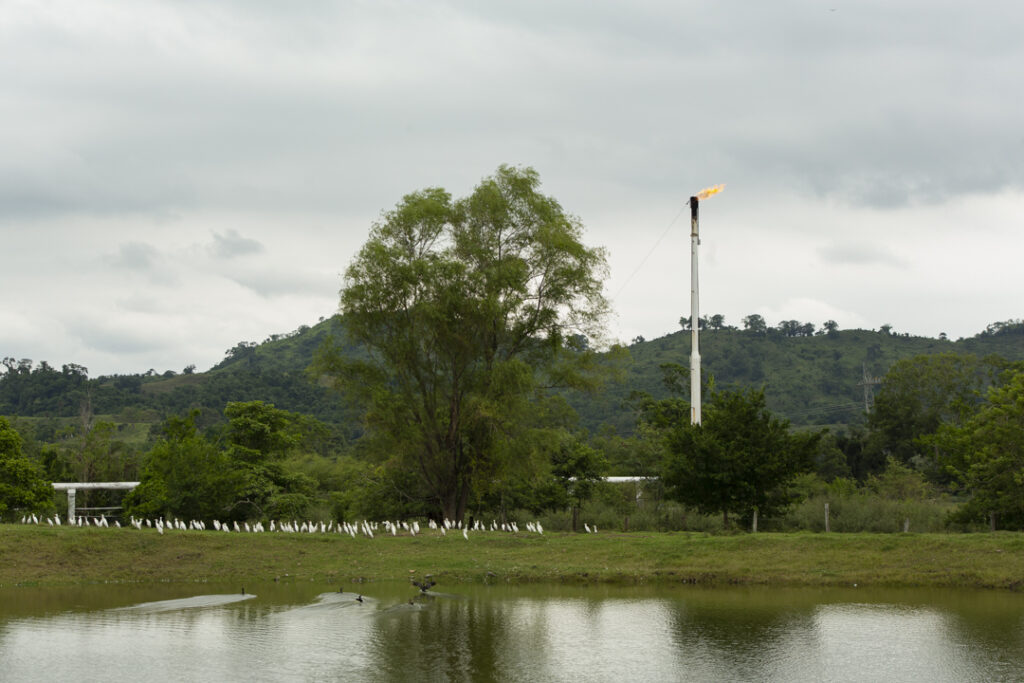
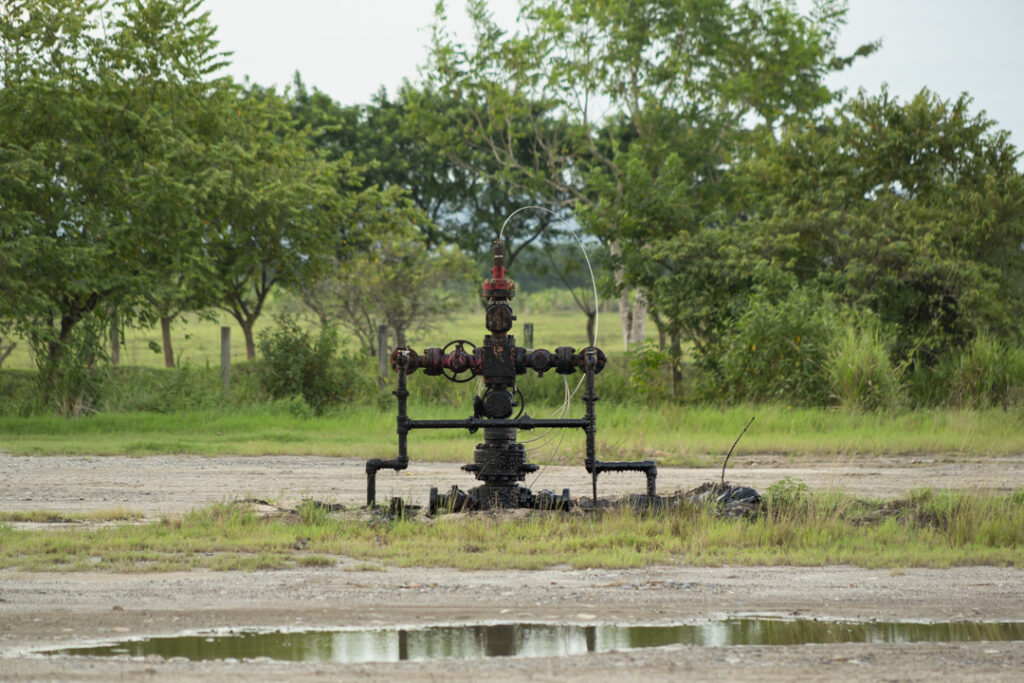
Photos: Regina López
We did not understand that it was linked to the megaproject. What do we defend ourselves from? Organized crime that began to arrive to our territory? Do we defend ourselves form the megaproject or from the company that is screwing us? Do we clean our stream? Do we do something about the venting gas? Or do we do something to protect our ears? That is the logic of terror.
AM: In what circumstances do you witness the link between crime and the state?
OE: When we began to organize with other collectives, families of human rights defenders looking for their disappeared, we began to encounter really weird logics. We are defending our territory so that the wells don’t do damage, and those collectives are searching inside the wells for their disappeared loved ones.
Because of the thousands of wells in Totonacapan, the majority aren’t being used. They are old wells, from deposits that have already been explored and exploited and that have very little (hydrocarbons) and are not profitable until they frack them. Yet the oil infrastructure remains.
For example, there is one old well and facility that looked like a hotel. Organized crime groups carried out their meetings there. They didn’t give it to the community who asked for it to convert it into a high school, but they did let organized crime occupy the space. So, we said, “This is not logical.” How can organized crime come and install a “kitchen” (what they call an extermination center) in one of the PEMEX zones, and PEMEX has security and the businesses have security but nothing happens.
The people of the community said to us, years afterwards, that they saw that organized crime stopped using the space for their meetings, they came to sweep it making piles of earth. Then they began dumping everything there, the remains of cars, things they that had stolen, human remains, barrels with holes where they dumped bodies. It is a perverse logic.
AM: You mentioned the dispossession is not only territorial. What are its other expressions?
OE: There is economic dispossession through the depreciation of campesino life, and at the same time, speculating on it, of people’s indebtedness, of loans.
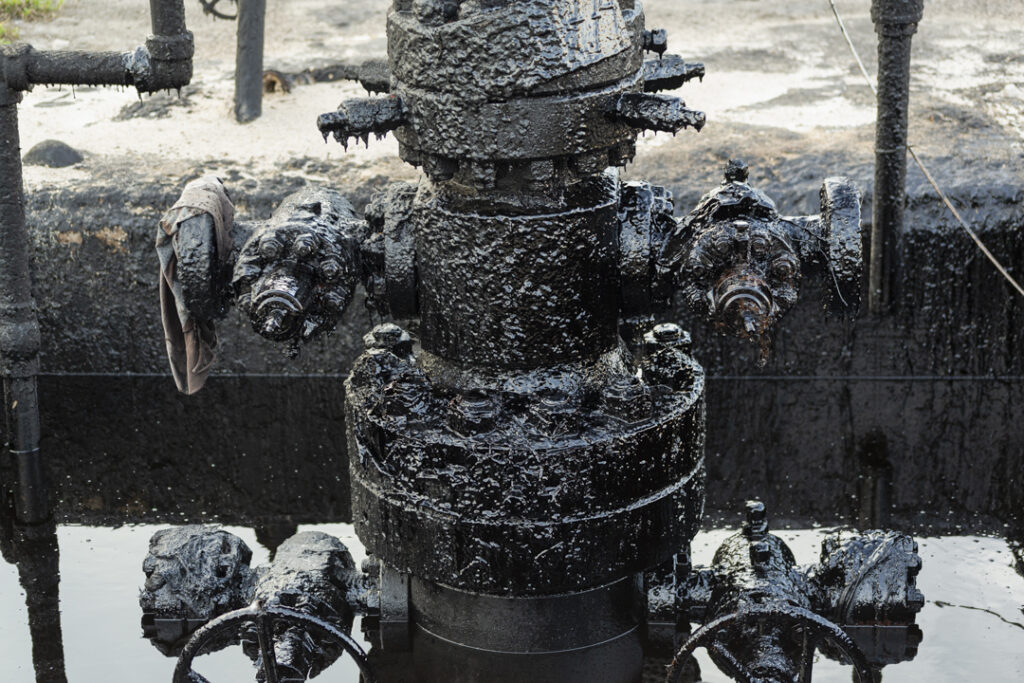
Infrastructure for the extraction of hydrocarbons in the municipality of Papantla, Veracruz. Photo: Regina López
There is organizational dispossession taking away the strength of the assembly and its authorities. Political dispossession because the people can no longer make decisions over their territory. If there is a pipeline, the first thing you see in your plot of land is a “no digging” sign, so what are we to do? And next in your plot, the oil spill that you cannot clean up. How do you clean it up?
AM: How do the companies articulate with other actors to dispossess territories?
OE: The public universities were making alliances with businesses and with PEMEX to collaborate in the dispossession. If it wants to continue to call itself a public university it should carry out investigations on the dispossession and declare itself free of fracking. So too should the communities. The public university has to declare itself free of fracking. But the first thing they did was implement a “new educational offer: petroleum engineer,” that is to say, engineer of dispossession.
Oscar Espino emphasizes in sharing the analysis of the inhabitants of northern Veracruz, to reflect “as a mirror, as the CNI has taught us,” in order to collaborate with other communities and resistance processes to identify in advance the actors and the logics in which the imposition of megaprojects takes place.
“Sometimes we don’t imagine this perverse logic of terror imposed on our communities, and it takes us a long time to discover it,” sustains Espino about the importance of analyzing the power of companies, their connection with crime, and the consent of public officials to confront “projects of supposed development.”
“There are marvelous examples of the campesino and indigenous communities struggling against these projects, but we believe that this exercise of reflecting on the painful reality of some can help us heal and strengthen our own communities before the pain arrives,” he concludes.


